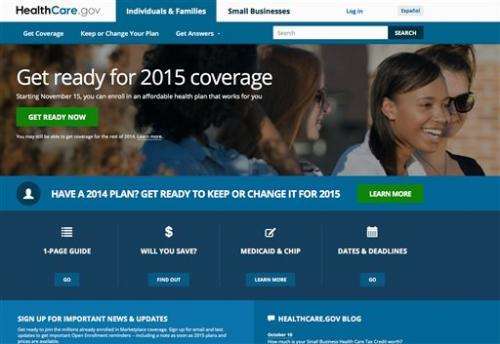Stronger start for Obama's health law this year

Sign-up season for President Barack Obama's health care law is off to a stronger start this year, even as Americans remain skeptical that the government's newest social program is right for the country.
As one major enrollment deadline was passing Monday, other second-year milestones quickly approached. The administration seems well on the way to its goal of 9.1 million customers enrolled for private coverage through government-sponsored online markets. But it's not there yet.
Public attitudes toward Obama's signature law are only slightly less chilly than before the congressional midterm elections that saw Republicans, still clamoring for its repeal, win both chambers of Congress.
An Associated Press-GfK poll earlier this month found an uptick for the Affordable Care Act, with 29 percent saying they support it, compared with 25 percent in October. Opposition to "Obamacare" was stable at 41 percent, while the rest were on the fence.
In nearly every state, Monday was the deadline for new customers to pick a health plan to take effect Jan. 1, and for current enrollees to make changes that could reduce premium increases before the new year. Open enrollment season doesn't end until Feb. 15, for coverage that takes effect March 1. Current customers can still make plan changes through that date.
Based on early numbers from the administration, it's looking like the majority of the 6.7 million current customers have opted to stay in their current plans and be automatically renewed on Jan. 1. Making sure that happens as smoothly as it's been advertised is the administration's next major challenge.
In Des Moines, Iowa, Cheryl James said she and two of her adult nieces helped each other and managed to sign up without too much trouble. James, who is studying early childhood education, found out she qualified for almost no-cost insurance under Iowa's Medicaid expansion, financed through the health care law.
"We are pretty satisfied with the coverage," said James, who's in her late 40s. "It took a couple of tries, but we weren't frustrated. It wasn't difficult."
Like Iowa, Tennessee has a Republican governor. On Monday it became the 28th state to accept the health care law's Medicaid expansion. Even as congressional Republicans are still vowing to overturn the law, 10 GOP governors have initiated expansions in their states.
As Monday's deadline for Jan. 1 coverage approached, HealthCare.gov and state health insurance websites saw a jump in traffic. Wait times at the federal call center stretched to 20 minutes and longer. The federal government is running the insurance markets in 37 states. Also known as exchanges, the markets offer subsidized private plans to people who don't have coverage on the job.
Consumers have different motivations for signing up. Enrollment counselors say they are starting to see more people worried about incurring fines for remaining uninsured. The fines are going up substantially in 2015, to a minimum of $325, from $95 this year.
"We are seeing a surge of folks coming back with questions," said Nita Carter of UHCAN Ohio, an advocacy group promoting sign-ups. "We are also seeing a surge of uninsured people who understand they will have to pay a penalty, and they want to get insurance."
Health insurance companies can no longer turn people away because of health problems, but picking a plan still is daunting for many. Consumers also have to navigate the process of applying for or updating federal subsidies, which can be complex. Many returning customers are contending with premium increases generally in the mid-to-high single digits, but much more in some cases.
Last year's open enrollment season turned into a race to salvage the reputation of the White House by fixing numerous technical bugs that crippled HealthCare.gov from its first day. With the website now working fairly well, sign-up season this year is a test of whether the program itself is practical for the people it is intended to serve.
The administration's next big logistical challenge is making sure that millions of current customers will have a smooth transition to 2015. The plan is for their existing coverage to renew seamlessly, but it's the first time the government has attempted to coordinate that transition.
Most current customers who do nothing will be automatically renewed Jan. 1 in the plan they now are in, and that still may be a good idea for many consumers who missed Monday's deadline for Jan. 1 changes.
But staying in their current plans also may mean getting locked into a premium increase and missing out on lower-priced plans for 2015. It also means keeping the 2014 tax credit, which may be less than what enrollees legally would be entitled to for next year.
___
Associated Press Director of Polling Jennifer Agiesta contributed to this report.
© 2014 The Associated Press. All rights reserved.

















